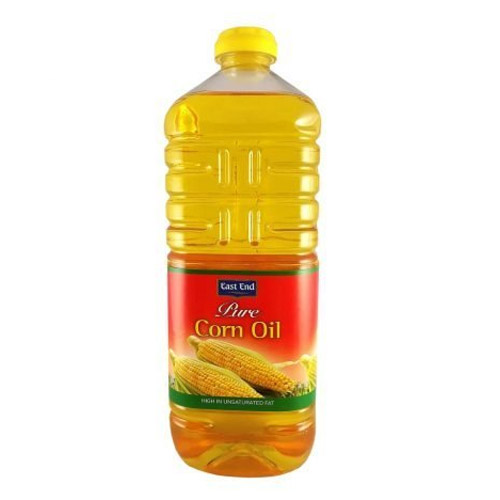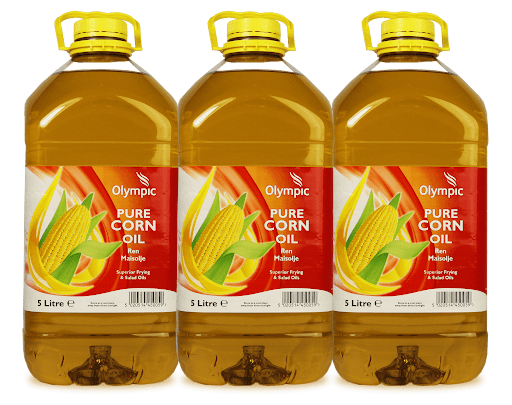Refined corn oil is a popular vegetable oil made from the germ of corn kernels. It’s widely used for cooking and food processing due to its high smoke point, neutral taste, and versatile applications. Corn oil is also valued in the industrial sector and is an ingredient in biodiesel, cosmetics, and other products. Here, we’ll explore its production, nutritional profile, health benefits, culinary applications, and environmental impact in detail.
1. Overview of Refined Corn Oil
Corn oil is extracted from the germ, the small part of the kernel that has the highest concentration of oil. Through a refining process, the oil is purified, removing impurities, colors, and odors to make it suitable for cooking and other uses. The refining process makes corn oil more shelf-stable, suitable for high-heat cooking, and neutral in taste, allowing it to blend seamlessly into many recipes and processed foods.
2. Production Process of Refined Corn Oil
The production of refined corn oil involves several steps:
- Extraction: Corn kernels are cleaned, conditioned, and de-germed. The oil is extracted from the germ using either mechanical pressing or a solvent extraction process, typically hexane.
- Refining: The oil undergoes a series of refining steps to remove impurities:
- Degumming: Phospholipids are removed from the oil to improve stability and clarity.
- Neutralization: Free fatty acids are removed to prevent rancidity.
- Bleaching: Pigments and color compounds are removed, resulting in a clear oil.
- Deodorization: The oil is treated with steam to remove any residual odors.
- Winterization (optional): Some corn oils undergo winterization, a process that removes waxes and makes the oil stable at cooler temperatures, ideal for salad dressings and dips.
This refining process yields a light, clear oil with a high smoke point (around 450°F or 232°C) and a long shelf life, making it an excellent choice for commercial and home cooking.
3. Nutritional Profile of Refined Corn Oil
Corn oil has a composition that includes healthy unsaturated fats, primarily polyunsaturated fats, with smaller amounts of monounsaturated and saturated fats. A typical serving (1 tablespoon) provides:
- Calories: Around 120-130 calories
- Total Fat: Approximately 13.6 grams
- Polyunsaturated Fat: About 7.5 grams
- Monounsaturated Fat: Around 3.5 grams
- Saturated Fat: Roughly 1.7 grams
Additionally, corn oil contains:
- Vitamin E: An antioxidant that protects cells from oxidative stress.
- Phytosterols: Plant compounds that may help reduce cholesterol levels.
The oil is free from trans fats and cholesterol, making it a preferred choice for heart-healthy diets when used in moderation.
4. Health Benefits of Refined Corn Oil
Refined corn oil offers several health benefits, largely due to its unsaturated fat content and antioxidant properties.
- Heart Health: Corn oil’s high level of polyunsaturated fats, particularly omega-6 fatty acids, can support cardiovascular health by lowering LDL (bad cholesterol) levels. The oil’s phytosterol content also helps reduce cholesterol absorption in the intestines, promoting heart health.
- Rich in Vitamin E: This antioxidant aids in protecting cells from damage, supports skin health, and may help reduce the risk of heart disease.
- Potential Anti-inflammatory Effects: The unsaturated fats in corn oil may help reduce inflammation, which is linked to chronic diseases such as heart disease and arthritis.
It’s worth noting, however, that corn oil is high in omega-6 fatty acids. While omega-6 is essential in the diet, an imbalance of omega-6 to omega-3 can potentially lead to increased inflammation, so balancing it with omega-3 sources (like flaxseed, fish, and walnuts) is recommended.
5. Culinary Uses of Refined Corn Oil
Corn oil’s versatility makes it one of the most commonly used cooking oils:
- Frying and High-Heat Cooking: Its high smoke point allows it to withstand high temperatures, making it ideal for frying, sautéing, and grilling without burning or breaking down.
- Baking: Corn oil’s neutral taste and moisture-retaining properties make it a good choice for baked goods, including cakes, muffins, and bread.
- Salad Dressings and Sauces: Refined corn oil’s light texture and taste allow it to blend well into dressings, marinades, and dips without overwhelming other flavors.
- Food Manufacturing: Corn oil is a popular choice in processed foods such as margarine, mayonnaise, and snacks due to its stability and long shelf life.
6. Industrial Uses of Refined Corn Oil
Beyond its culinary applications, refined corn oil has uses in various industries:
- Biodiesel Production: Corn oil is one of the sources of biodiesel, providing a renewable and biodegradable alternative to fossil fuels.
- Cosmetic and Skincare Products: Its moisturizing and antioxidant properties make it suitable for lotions, creams, and soaps.
- Lubricants and Surfactants: Corn oil is also used in the manufacture of eco-friendly lubricants and surfactants due to its non-toxic nature.
7. Comparison with Other Cooking Oils
Corn oil is often compared with other oils in terms of health benefits, smoke point, and applications:
- Olive Oil: Olive oil is rich in monounsaturated fats and antioxidants, suitable for dressings and low-heat cooking. Corn oil, on the other hand, has a higher smoke point, making it better suited for frying.
- Canola Oil: Canola oil has a similar smoke point and is also high in polyunsaturated fats, but it has a better omega-6 to omega-3 balance, making it a more balanced choice for heart health.
- Soybean Oil: Like corn oil, soybean oil is high in polyunsaturated fats, but it has a higher omega-3 content, making it a more balanced option in terms of fatty acids.
- Sunflower Oil: Known for its high vitamin E content, sunflower oil is similar to corn oil in terms of flavor and smoke point, making them both suitable for frying and baking.
8. Environmental Impact of Corn Oil Production
Corn oil production has an environmental footprint, primarily related to large-scale corn farming:
- Land Use and Deforestation: Expanding corn cultivation often leads to deforestation and habitat loss.
- Soil Health: Corn is a resource-intensive crop, and continuous farming can lead to soil depletion, requiring crop rotation and sustainable farming practices.
- Water Consumption: Corn farming is water-intensive, which can contribute to water scarcity in some regions.
- Pesticide and Fertilizer Use: Corn farming typically involves high use of pesticides and fertilizers, which can harm local ecosystems and lead to pollution.
Sustainable agricultural practices and certified corn oil products can help mitigate these environmental impacts.
9. Health Considerations and Risks
While corn oil has health benefits, there are some considerations to keep in mind:
- Omega-6 to Omega-3 Ratio: Corn oil is high in omega-6, which, without sufficient omega-3, can lead to an inflammatory imbalance. A balanced intake of both fatty acids is important.
- Processing Effects: Some beneficial compounds may be reduced during the refining process, although the refining also makes it more stable for cooking.
- Allergy Potential: Although rare, some individuals may have sensitivities to corn oil, especially those with corn allergies.
10. Conclusion
Refined corn oil remains a valuable cooking oil with diverse culinary and industrial applications. It’s highly suitable for high-heat cooking, affordable, and provides health benefits when consumed in moderation. While there are health considerations related to its omega-6 content, using corn oil as part of a balanced diet and alongside other healthy oils can help maximize its benefits. As sustainability becomes a greater focus, choosing corn oil products sourced from responsible farming practices can contribute to a healthier planet.



